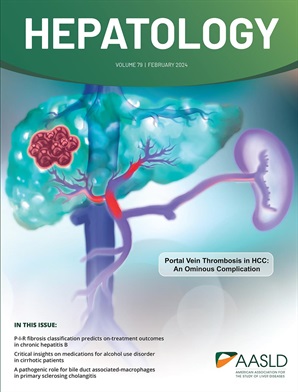新生儿T-bet+ Treg细胞产生的Proenkephalin促进门静脉周围肝细胞成熟。
IF 12.9
1区 医学
Q1 GASTROENTEROLOGY & HEPATOLOGY
引用次数: 0
摘要
调控出生后肝细胞在门静脉周围区分化和成熟的机制,其中Notch信号是高的,仍然不完全清楚。在这里,我们证明了淋巴细胞、CD4+ T细胞或T-bet+调节性T (Treg)细胞缺乏的2周龄小鼠,导管板细胞/胆管细胞分化增加,门静脉周围肝细胞成熟受损。我们发现门静脉周围区定位的T-bet+ Treg细胞的短暂富集及其proenkephalin (PENK)的表达对于协调该区域的肝细胞和胆管细胞分化至关重要。Treg细胞中的T-bet缺失影响其组织驻留特征的获得和PENK的表达。treg中Penk的缺失或纳曲酮(一种阿片生长因子受体(OGFr)的拮抗剂)的使用也会导致类似的肝缺陷。在缺乏T-bet+ Tregs的小鼠和三维肝细胞培养中,补充penk衍生的蛋氨酸脑啡肽(Met-ENK)可减少导管板胆管细胞,并促进肝细胞成熟。在分子上,Met-ENK/OGFr轴通过下调Adam10表达来抵消门静脉周围Notch信号,并通过上调Esrp2表达来促进成体剪接程序。我们的发现揭示了一种以前未被认识的机制,通过这种机制,门静脉周围T-bet+ Treg细胞独立于其免疫调节功能促进肝脏成熟。这也强调了treg相关免疫分区在促进新生小鼠门静脉周围肝细胞成熟中的关键作用。本文章由计算机程序翻译,如有差异,请以英文原文为准。
Proenkephalin produced by neonatal T-bet+ Treg cells promotes periportal hepatocyte maturation.
The mechanisms that govern postnatal hepatocyte differentiation and maturation in the periportal region, where Notch signaling is high, remain incompletely understood. Here we demonstrate that 2-week-old mice deficient in lymphocytes, CD4+ T cells or T-bet+ regulatory T (Treg) cells exhibit comparable increases in ductal plate cell/cholangiocyte differentiation and impaired periportal hepatocyte maturation. We found that the transient enrichment of periportal region-localized T-bet+ Treg cells and their expression of proenkephalin (PENK) are crucial for coordinating hepatocyte and cholangiocyte differentiation in this region. T-bet deletion in Treg cells impacts their acquirement of a tissue residence signature and their PENK expression. Depletion of Penk in Tregs or the administration of naltrexone, an antagonist of the opioid growth factor receptor (OGFr), results in similar liver defects. The supplementation of PENK-derived methionine enkephalin (Met-ENK) reduces ductal plate cholangiocytes and enhances hepatocyte maturation in mice lacking T-bet+ Tregs and in 3-dimensional hepatocyte culture. Molecularly, the Met-ENK/OGFr axis counteracts periportal Notch signaling by downregulating Adam10 expression and promotes adult splicing program by upregulating Esrp2 expression. Our findings uncover a previously unrecognized mechanism through which periportal T-bet+ Treg cells foster liver maturation independently of their immune regulatory functions. It also underscores the critical role of Treg-associated immune zonation in facilitating periportal hepatocyte maturation in neonatal mice.
求助全文
通过发布文献求助,成功后即可免费获取论文全文。
去求助
来源期刊

Hepatology
医学-胃肠肝病学
CiteScore
27.50
自引率
3.70%
发文量
609
审稿时长
1 months
期刊介绍:
HEPATOLOGY is recognized as the leading publication in the field of liver disease. It features original, peer-reviewed articles covering various aspects of liver structure, function, and disease. The journal's distinguished Editorial Board carefully selects the best articles each month, focusing on topics including immunology, chronic hepatitis, viral hepatitis, cirrhosis, genetic and metabolic liver diseases, liver cancer, and drug metabolism.
 求助内容:
求助内容: 应助结果提醒方式:
应助结果提醒方式:


